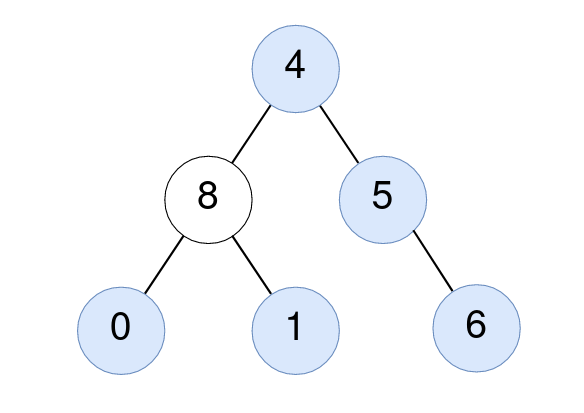Count Nodes Equal to Average of Subtree
MediumUpdated: Aug 2, 2025
Practice on:
Problem
Given the root of a binary tree, return the number of nodes where the value of the node is equal to theaverage of the values in its subtree.
Note:
- The average of
nelements is the sum of thenelements divided bynand rounded down to the nearest integer. - A subtree of
rootis a tree consisting ofrootand all of its descendants.
Examples
Example 1

Input: root = [4,8,5,0,1,null,6]
Output: 5
Explanation:
For the node with value 4: The average of its subtree is (4 + 8 + 5 + 0 + 1 + 6) / 6 = 24 / 6 = 4.
For the node with value 5: The average of its subtree is (5 + 6) / 2 = 11 / 2 = 5.
For the node with value 0: The average of its subtree is 0 / 1 = 0.
For the node with value 1: The average of its subtree is 1 / 1 = 1.
For the node with value 6: The average of its subtree is 6 / 1 = 6.
Example 2

Input: root = [1]
Output: 1
Explanation: For the node with value 1: The average of its subtree is 1 / 1 = 1.
Constraints
- The number of nodes in the tree is in the range
[1, 1000]. 0 <= Node.val <= 1000
Solution
Method 1 – Postorder DFS with Subtree Sum and Count
Intuition
For each node, we need to know the sum and count of all nodes in its subtree. We can use postorder DFS to compute these values for every node efficiently.
Approach
- Traverse the tree in postorder (left, right, root).
- For each node, recursively get the sum and count of its left and right subtrees.
- Compute the sum and count for the current node (including itself).
- If the node's value equals the integer average (sum // count), increment the answer.
- Return the answer after traversing the whole tree.
Code
C++
struct TreeNode {
int val;
TreeNode *left;
TreeNode *right;
TreeNode(int x) : val(x), left(nullptr), right(nullptr) {}
};
class Solution {
public:
int ans = 0;
std::pair<int, int> dfs(TreeNode* node) {
if (!node) return {0, 0};
auto [ls, lc] = dfs(node->left);
auto [rs, rc] = dfs(node->right);
int s = ls + rs + node->val, c = lc + rc + 1;
if (node->val == s / c) ans++;
return {s, c};
}
int averageOfSubtree(TreeNode* root) {
ans = 0;
dfs(root);
return ans;
}
};
Go
type TreeNode struct {
Val int
Left *TreeNode
Right *TreeNode
}
func AverageOfSubtree(root *TreeNode) int {
var ans int
var dfs func(*TreeNode) (int, int)
dfs = func(node *TreeNode) (int, int) {
if node == nil {
return 0, 0
}
ls, lc := dfs(node.Left)
rs, rc := dfs(node.Right)
s, c := ls+rs+node.Val, lc+rc+1
if node.Val == s/c {
ans++
}
return s, c
}
dfs(root)
return ans
}
Java
class TreeNode {
int val;
TreeNode left, right;
TreeNode(int x) { val = x; }
}
class Solution {
int ans = 0;
private int[] dfs(TreeNode node) {
if (node == null) return new int[]{0, 0};
int[] l = dfs(node.left), r = dfs(node.right);
int s = l[0] + r[0] + node.val, c = l[1] + r[1] + 1;
if (node.val == s / c) ans++;
return new int[]{s, c};
}
public int averageOfSubtree(TreeNode root) {
ans = 0;
dfs(root);
return ans;
}
}
Kotlin
data class TreeNode(var `val`: Int, var left: TreeNode? = null, var right: TreeNode? = null)
class Solution {
var ans = 0
fun averageOfSubtree(root: TreeNode?): Int {
ans = 0
fun dfs(node: TreeNode?): Pair<Int, Int> {
if (node == null) return 0 to 0
val (ls, lc) = dfs(node.left)
val (rs, rc) = dfs(node.right)
val s = ls + rs + node.`val`
val c = lc + rc + 1
if (node.`val` == s / c) ans++
return s to c
}
dfs(root)
return ans
}
}
Python
class TreeNode:
def __init__(self, val=0, left=None, right=None):
self.val = val
self.left = left
self.right = right
class Solution:
def averageOfSubtree(self, root: TreeNode) -> int:
self.ans = 0
def dfs(node: TreeNode) -> tuple[int, int]:
if not node:
return 0, 0
ls, lc = dfs(node.left)
rs, rc = dfs(node.right)
s, c = ls + rs + node.val, lc + rc + 1
if node.val == s // c:
self.ans += 1
return s, c
dfs(root)
return self.ans
Rust
pub struct TreeNode {
pub val: i32,
pub left: Option<Box<TreeNode>>,
pub right: Option<Box<TreeNode>>,
}
impl Solution {
pub fn average_of_subtree(root: Option<Box<TreeNode>>) -> i32 {
fn dfs(node: &Option<Box<TreeNode>>, ans: &mut i32) -> (i32, i32) {
if let Some(n) = node {
let (ls, lc) = dfs(&n.left, ans);
let (rs, rc) = dfs(&n.right, ans);
let s = ls + rs + n.val;
let c = lc + rc + 1;
if n.val == s / c { *ans += 1; }
(s, c)
} else {
(0, 0)
}
}
let mut ans = 0;
dfs(&root, &mut ans);
ans
}
}
TypeScript
class TreeNode {
val: number;
left: TreeNode | null;
right: TreeNode | null;
constructor(val?: number, left?: TreeNode | null, right?: TreeNode | null) {
this.val = val ?? 0;
this.left = left ?? null;
this.right = right ?? null;
}
}
class Solution {
averageOfSubtree(root: TreeNode | null): number {
let ans = 0;
function dfs(node: TreeNode | null): [number, number] {
if (!node) return [0, 0];
const [ls, lc] = dfs(node.left);
const [rs, rc] = dfs(node.right);
const s = ls + rs + node.val, c = lc + rc + 1;
if (node.val === Math.floor(s / c)) ans++;
return [s, c];
}
dfs(root);
return ans;
}
}
Complexity
- ⏰ Time complexity:
O(n), where n is the number of nodes, since we visit each node once. - 🧺 Space complexity:
O(h), where h is the height of the tree, due to recursion stack.